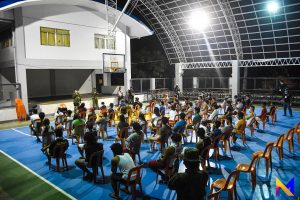Javier Salvador Parra, a resident of a private subdivision in Metro Manila’s Makati City, was told Sunday that police were waiting outside his home to fine him as his helper, who was watering plants, was not wearing a face mask.
When Parra stepped outside to dispute the fine and began cursing at police, he was physically assaulted and nearly arrested as his wife begged the officers to stop.
Video of the incident sparked outrage in the Philippines, which recently announced it would tighten coronavirus lockdown measures in hard-hit areas and arrest all quarantine violators without warrants.
The Philippines last week extended lockdowns in Manila and other high-risk areas until May 15, with some areas set to go under temporary “hard lockdowns” to contain the spread of COVID-19.
Over 120,000 people have been cited for quarantine violations and over 30,000 have been arrested, believed to be the highest number in the world. Philippine police said last week it would stop issuing citations to alleged violators, instead arresting them immediately.
The United Nations raised concerns this week over the “highly militarized response” to the coronavirus in the Philippines, noting that strict restrictions often target the poor and vulnerable.
Georgette Gagnon, director of field operations for the UN’s human rights office, told journalists during an online press conference the Philippines was one of several countries where “police and other security forces are using excessive and sometimes deadly force to enforce lockdowns and curfews.”
The “unreasonable or arbitrary detention for curfew violations,” a common practice in the Philippines, “is an unnecessary and unsafe practice,” she said. “Jails and prisons, as we all know, are a high-risk environment for the spread of the virus.”
Human Rights Watch said this week the Philippines was not fully reporting deaths in the country’s already overcrowded prisons. At least seven inmates in two jails have died since March 25, according to five inmates interviewed by Human Rights Watch.
COVID-19 is rapidly spreading in jail facilities throughout the Philippines, including several institutions in Metro Manila and at least four facilities in the Cebu area. One of those facilities, the Cebu City Jail, has recorded a total of 212 COVID-19 infections as of Thursday.
According to Human Rights Watch, inmates in two jails in Quezon City and Cavite said they have seen more deaths than usual and fear outbreaks in the overcrowded facilities. Inmates working as “medical aides” have been made to carry bodies without proper protective equipment, contrary to WHO guidelines.
“The government needs to release vulnerable prisoners immediately and ensure that the medical needs of the remaining detainees are met,” HRW’s deputy Asia director, Phil Robertson, said in a press release.
But Philippine President Rodrigo Duterte has shown no indication he will release prisoners, instead ordering more quarantine violators to be arrested.
The Philippine Supreme Court directed lower courts to release prisoners facing charges for low-level and nonviolent crimes who are elderly, sick, or have underlying medical conditions. But the petition was blocked by the country’s solicitor general, who said “congestion in prison facilities is not among the grounds to release inmates.”
The Supreme Court announced Thursday it would allow some prisoners to be granted reduced bail or release on recognizance without a bail payment.
The court has still not ruled on a petition filed earlier in April to release political prisoners who are sick, elderly, or have pre-existing health conditions.
Several instances of police abuse have been recorded in the weeks since Duterte told law enforcement officials who encounter anyone “who creates trouble” to “shoot them dead.”
Earlier in April, a man in Mindanao was killed at a coronavirus checkpoint after allegedly threatening officials with a scythe. Detainees have been locked in dog cages and forced to sit under the hot midday sun, according to Human Rights Watch.
Last week, repeating a previous warning, Duterte said he would enforce “martial law” in the country if necessary.
Parra, speaking to Rappler, said he was concerned that, had cameras not been filming his encounter with Makati police, he may have been shot – a reference to the death of Winston Ragos, a retired corporal reportedly suffering from schizophrenia and trauma. Ragos was shot dead by Quezon City police for allegedly violating quarantine rules.
“My concern is mainly that this police officer and Makati police does this also to the poor,” Parra told Rappler. “Filipinos are all in a dire situation with the lockdown, the last thing they need is Makati policemen [wreaking] havoc on Makati citizens.”

































